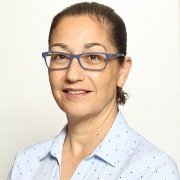ליאת היא פרופסור חבר בבית הספר לעבודה סוציאלית ע"ש בוב שאפל. את שלושת תאריה (B.S.W, M.S.W, Ph.D.) רכשה בבית הספר לעבודה סוציאלית באוניברסיטת תל אביב. עבודתה המדעית של פרופ' חממה מתמקדת בעיקר בחשיפת הקשרים בין מצבי דחק/טראומה, משאבים אישיים וסביבתיים ורווחה סובייקטיבית. מחקריה מעוגנים במודלים תיאורטיים מתיאוריות של לחץ והתמודדות, והיא מרחיבה אותם תוך בחינת שאלות סלוטוגניות בהתייחס לשלוש אוכלוסיות יעד מרכזיות: ילדים, מתבגרים, ואוכלוסיות התומכות בהם או סובבות אותם (כגון הורים, עובדים סוציאליים, מורים וספקי בריאות).
הקורסים המרכזיים שהיא מלמדת עוסקים במיומנויות התערבות עם ילדים ובני נוער, פרקטיקום קליני ממוקד בילדים ובני נוער, סוגיות של בריאות וחולי בקרב ילדים, בעיות רגשיות והתנהגותיות בילדים, טיפול קוגניטיבי-התנהגותי, וקורסים נוספים. בנוסף, היא מנחה סטודנטים במסלול המחקרי בנושאים שבהם היא עוסקת במחקריה ובעבודתה המדעית.
פרופ' חממה נמנית עם "רשימת המאה" של המרצים המצטיינים בהוראה באוניברסיטת תל אביב מאז שנת 2010. בין השנים 2010–2023 נבחרה ארבע פעמים כ"מצטיינת רקטור בהוראה.
בספטמבר 2021 מונתה פרופ' חממה לתפקיד ראש "מרכז אדלר לרווחת הילד ושלומו" - המרכז משמש מסגרת למחקר, להכשרה ולפיתוח מדיניות ותוכניות בתחום רווחת הילד בארץ ובעולם.
פרסומים נבחרים
Hamama, L., Sarid, O., & Hamama-Raz, Y. (2025). Psychological distress, resources, and coping strategies among evacuees and non-evacuees from armed conflict zone: A network analysis. Stress and Health, 41, e3525. DOI: https://doi.org/10.1002/smi.3525
Hamama, L., Finklestein, M., & Hamama-Raz, Y. (2024). Adolescents' posttraumatic growth during the COVID-19 pandemic: The links between differentiation of self, parents' posttraumatic growth, and adolescents' gender. Children and Youth Services Review, 167, 108022. DOI:https://doi.org/10.1016/j.childyouth.2024.108022
Hamama, L., & Levi S. (2024). Adolescent siblings of children with cancer: Resource-based profiles, normalization, and search for meaning in life. Journal of Adolescence, 96(2), 221-234. DOI: https://doi.org/10.1002/jad.12269
Hamama, L. (2024). Perceived social support, normalization, and subjective well-being among family members of a child with autism spectrum disorder. Journal of Autism and Developmental Disorders, 54, 1468–1481.DOI: https://doi.org/10.1007/s10803-022-05857-9
Hamama, L. (2022). Modeling linkages between self-efficacy, normalization, and well-being factors among Israeli mothers of children with neurodevelopmental disorders. Research in Developmental Disabilities, 128, 104295. DOI: https://doi.org/10.1016/j.ridd.2022.104295
Hamama, L., & Levin-Dagan, N. (2022) People who contracted COVID-19: The mediating role of shame and guilt in the link between threatening illness perception and mental health measures. Anxiety, Stress and Coping, 35(1), 72–85. DOI: https://doi.org/10.1080/10615806.2021.1964073
Hamama, L., & Gaber, S. (2021). Seeing the siblings: Gender differences in emerging-adult siblings of individuals with Autism. Research in Developmental Disabilities, 108, 103829. DOI: https://doi.org/10.1016/J.RIDD.2020.103829
Hamama, L., & Hamama-Raz, Y. (2021). Meaning in life, self-control, positive and negative affect: Exploring gender differences among adolescents. Youth & Society, 53(5), 699-722. DOI: https://doi.org/10.1177/0044118X19883736
Hamama, L., & Alshech, M. (2018). Children with Epilepsy: Assessing state anxiety through drawings and a self-report questionnaire. Arts & Health, 12(2), 139–153. DOI: https://doi.org/10.1080/17533015.2018.1534250
Hamama, L., & Sahron, M. (2013). Posttraumatic growth and subjective well-being among caregivers of chronic patients: A preliminary study. Journal of Happiness Studies, 14(6), 1717–1737. DOI: https://doi.org/10.1007/S10902-012-9405-8
Hamama, L. (2012). Differences between children's social workers and adult social workers in the sense of burnout, work conditions, and organizational social support. British Journal of Social Work, 1–21. DOI: https://doi.org/10.1093/BJSW/BCR135


